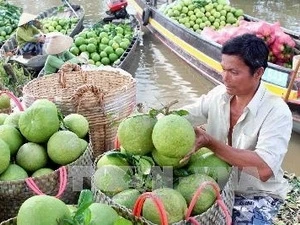Hanoi (VNA) – Vietnam’s national brand value, despite rising two places in 2018, remains modest, requiring more efforts by different sides, heard the Vietnam Brand Forum held by the Ministry of Industry and Trade in Hanoi on April 17.
Last year, Vietnam ranked 43rd out of the world’s top 100 valuable national brands, up two places over the previous year thanks to the Vietnam Value Programme.
Dependence on export of raw products, processing and assembling
Under the list of world top 100 valuable national brands in 2018 announced by Brand Finance, the world’s leading independent branded business valuation and strategy consultancy, Vietnam’s national brand was priced at 235 billion USD, entering the strong national brand group.
Vietnam’s positionin the ranking improved thanks to great contributions by the Vietnam Value Programme and the Government’s efforts to boost economic growth.
However, many Vietnamese-originated products have yet to help raise export revenue. Associated Prof. Dr. Nguyen Van Thao, Vice Chairman of the Party Central Committee’s Theory Council, Vietnam is yet to have prestigious trademarks, thus the country’s brand value remains low.
He noted that the situation has maintained for years, therefore, Vietnam has been considered an exporter of raw materials for big brand names.
He underscored the urgent need for the country and businesses to build a national trademark.
Meanwhile, Nguyen Huu Nghia, Vice Chairman of the Party Central Committee’s Economic Commission, said that weaknesses in brand building and management have been seen in many companies.
Moreover, a number of enterprises do not take trademark as a tool to bring their products closer to consumers, he added.
Nghia said that the image promotion has yet to be conducted comprehensively and systematically, while many Vietnamese products have yet to form a strong trademark in domestic and world markets.
 Deputy Minister of Industry and Trade Do Thang Hai addresses the Vietnam Brand Forum (Photo: VietnamPlus)
Deputy Minister of Industry and Trade Do Thang Hai addresses the Vietnam Brand Forum (Photo: VietnamPlus) Promotion plays key role
From the view of a consumer, Antonio Tedesco from the Italian Embassy in Hanoi said that although many Vietnamese products are good, promoting them abroad has remained weak.
In order to tackle the problem, he held that it is necessary to optimize the network of trade counsellors and offices overseas, while mobilizing resources from the Vietnamese community all over the world to introduce made-in-Vietnam products to foreign consumers.
Particularly, in the process of building trademarks, Vietnam should pay greater attention to the target, scope and strategy in order to ensure efficiency, along with the protection of the trademarks, he said.
“We should not introduce an individual trademark, but the trademarks of collectives to gain a broader approach to consumers in the world,” stated Tedesco.
At the same time, Vu Ba Phu, head of the Trade Promotion Agency, said that the MoIT is building and will submit to the Prime Minister a project on implementing the Vietnam Value Programme in the new period with an aim to connect trademarks of businesses with investment attraction and culture-tourism promotion, thus making the Vietnam national brand a positive and attractive image for importers and consumers in and outside the country.
Besides, the programme will recognize collective trademarks and geographic indications, while strengthening communication work to promote the brands, he said.
He added that in the coming time, the programme will consider the recognition of Hung Yen “long” longan, “Canh” orange and Thanh Ha lychee as national brands, facilitating the promotion of regional specialties to the domestic and global markets./.






















